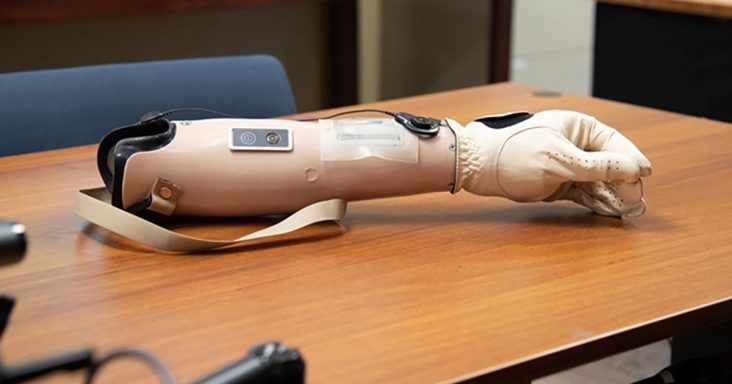Walter Reed National Military Medical Center joins prosthesis study at UA with $4.9M grant
by August 29, 2023 3:55 pm 707 views

A neural-enabled prosthetic hand system.
The U.S. Department of Defense has awarded a $4.9 million grant to the University of Arkansas’ Institute for Integrative and Innovative Research (I3R).
According to a UA news release Tuesday (Aug. 29), the funding will expand a clinical trial for an innovative neural-enabled prosthesis currently occurring at the UA campus in Fayetteville and including Walter Reed National Military Medical Center in Maryland as an additional clinical trial site.
The first-of-its-kind work aims to restore a sense of touch to individuals with upper limb amputation. It is the first time the UA has collaborated with Walter Reed, which houses one of the United States’ premier clinics for patients with amputations and is one of just three military hospitals that treat traumatic upper extremity amputations.
“We’re thrilled to receive such a significant grant award under the Joint Warfighter Medical Research Program for continued development and evaluation of an advanced prosthetic device as a potential medical solution that restores meaningful sense of touch to individuals with upper limb amputations,” Ranu Jung, associate vice chancellor and I³R executive director, said in the news release. “We’re honored to collaborate with Walter Reed National Military Medical Center to extend this life-changing innovation to our service men and women who have sustained traumatic upper limb injuries in service to our country.”
The ongoing clinical trial has two participants so far, according to the UA. The first study participant received his device in 2018 when the project was based at Florida International University. The second occurred this year in Arkansas through an I³R-led collaboration with the University of Arkansas for Medical Sciences and Snell Prosthetics and Orthotics.
For more details, click here for the UA news release.
The I³R is under construction on the corner of Duncan Avenue and Dickson Street on the UA campus. It’s expected to open in the fall of 2024.
